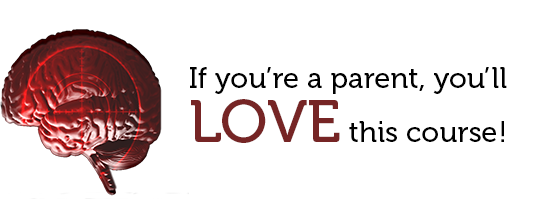Workshops
John Joseph’s Workshop Programs
For Teachers, Leaders, and Administrators:
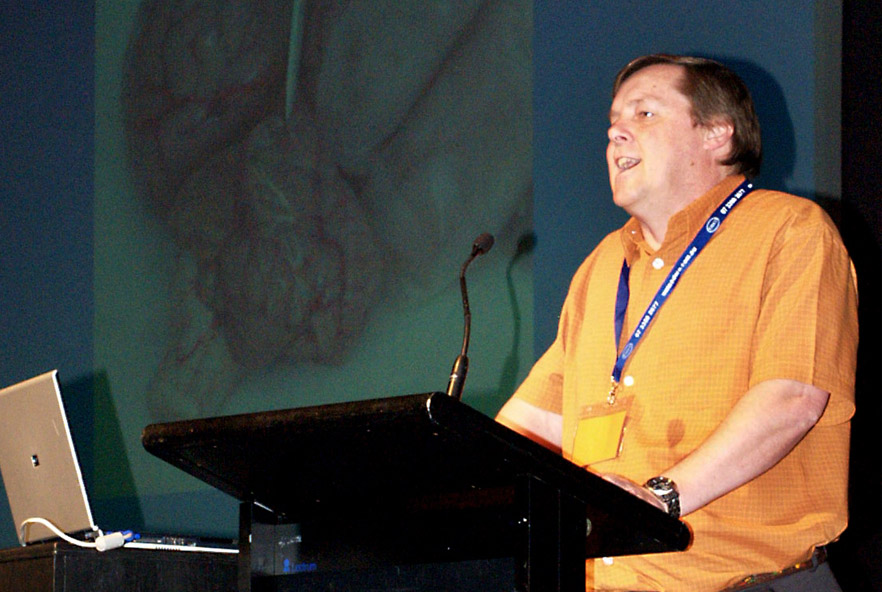
For Students
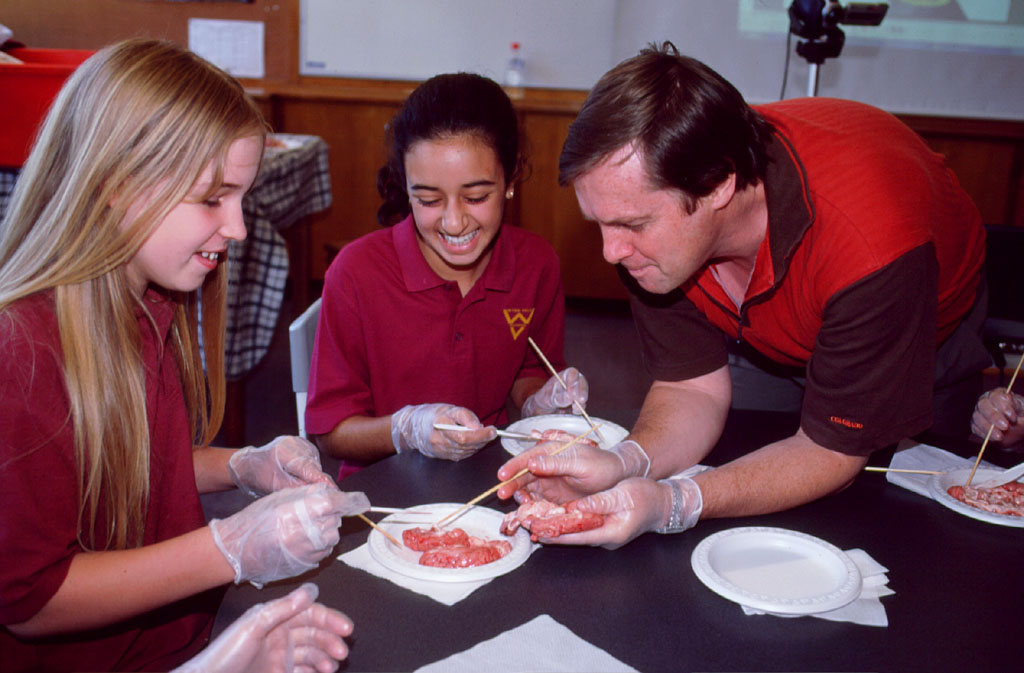
For Families

Online WORKSHOPS
Workshop 13
Workshop 15
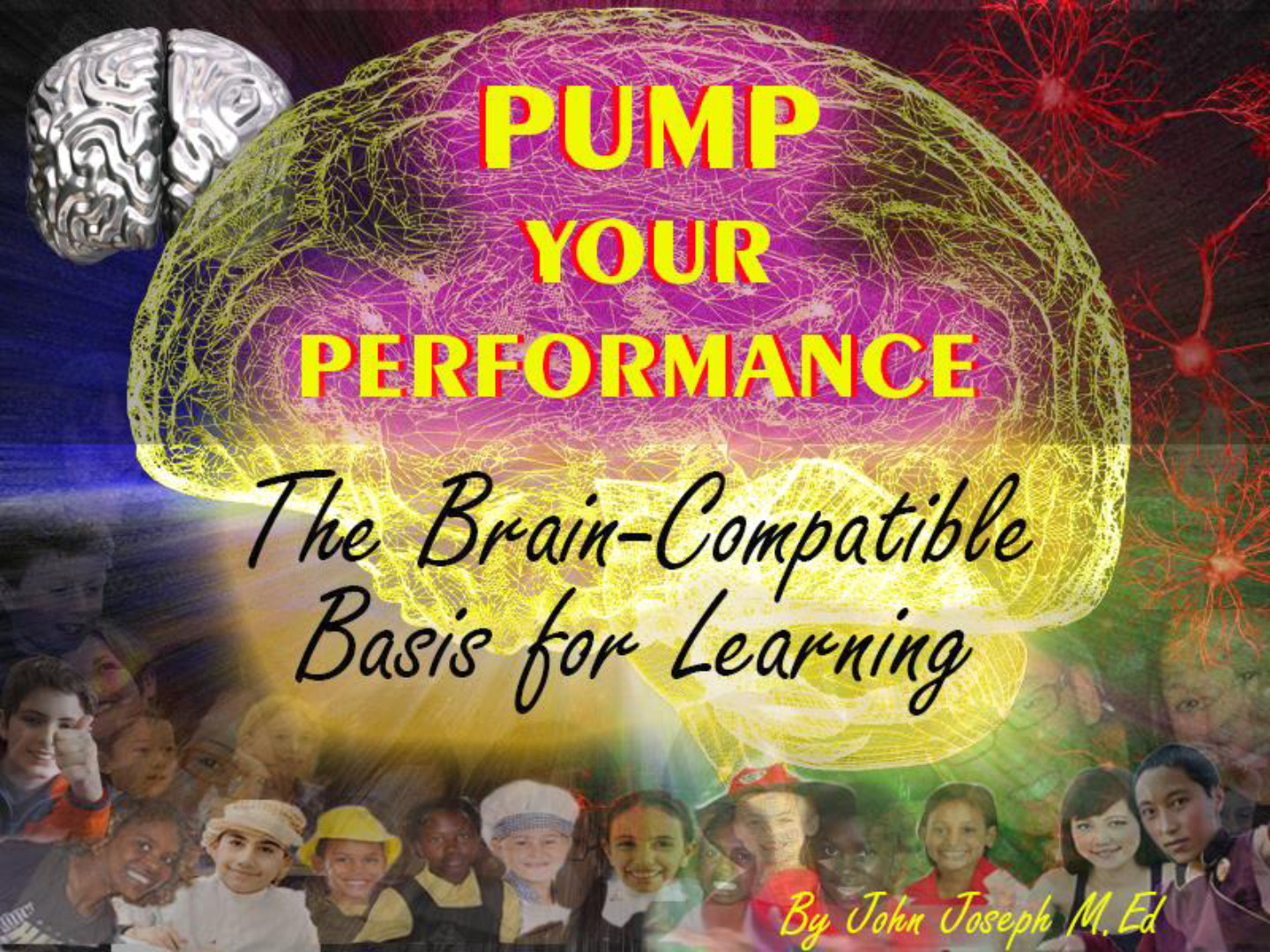
Workshop 1 – Neuroeducation
This course explores some of the key findings linked to neuroscience/brain research and challenges educators to think about student identity, concept development, memory and learning, motivation, the importance of sleep and why learning about learning is a key factor in improved student engagement.
Content:
1. Setting the scene: why is knowing about the brain important in today’s schools
2. What is neuro-education: 25+ brain-compatible teaching and learning strategies
3. How the Brain Learns: enhancing our contemporary neuro-education perspective of learning
4. Older-Views – Newer-Views: changing views about the brain, learning, memory and intelligence
5. Generation Gaps: innovative teaching for a modern, interconnected and changing world.
6. Closing the achievement gap: ways to reduce the gap between the lowest and highest performing students
7. PISA: why Finland, Sth Korea, China and Poland dominate international student rankings.
8. Effect Sizes: which innovations make the biggest difference to learning, drawing on key research evidence
9. Building student Motivation and Confidence: creating the conditions for engaging all learners
10. The Four Worlds: crafting education experiences for the Heart, the Hands, the Intellect and the Future
11. Information Processing Model: ways to teach using explicit levels of memory and stages of learning.
12. Teaching Strategies: knowing what, when and why to select strategies that improve student learning
13. Why the brain forgets: striking the balance between memory, forgetting and thinking
14. The purposes and benefits of Homework: 5 strategies to make homework more. efficient and more effective
15. The critical role of sleep in learning: brain care for optimal learning and decreased off-task behaviour

Workshop 2 – Developing Emotional Intelligence
For those interested in what neuroscience and current well-being research are saying about how best to enhance students’ emotions, self-talk, behaviour and concepts. This course explores why people act as they do, and how to use questions and statements that inspire rather than shut-down or alienate others. It is an inspiring workshop!
Content:
1. Introduction to the Emotional Rooms Model: a model of hope and inspiration
2. Understanding feelings and emotions: neuro-education perspectives on how to manage emotions
3. Attitudes and Concepts: how students’ thoughts and emotions influence their thinking and behaviour
4. Effects of allostasis, stress, boredom and enrichment on brains: creating ideal classroom conditions
5. The Concept Model: using questions rather than statements to build optimism and healthy thought patterns
6. The Hope and Despair Cycles: teaching students how to manage key emotions
7. Energisers and Engagement: using emotions to shift focus; to maximise engagement and to boost learning
8. Introducing the ‘Chatz’: teaching students how to manage their our own self-talk
9. Student Voice: ways to share authentic power with students; moving from being ‘done to’ to ‘working with’
10. Developing Student Leadership: students as active participants in self-review and school improvement
11. Planning and presenting lessons with the Emotional Rooms Model: classroom practical applications
12. Behaviour rubrics: constructing frameworks for behaviour, consequences and reporting to parents
13. Discipline with dignity: non-punitive management strategies for every classroom
14. Red Room: strategies for management and prevention of crisis situations
15. The Strengths, Challenges and Growth Meter: a tool for identifying problems and planning growth

Workshop 3 – Assessment with the Brain in Mind
A practical and innovative formative assessment course designed to bring your students into the learning design and assessment processes. Shift more responsibility to students and build engagement by giving students a voice in their learning and obtain their support in documenting it.
Content:
1. The importance of feedback in the learning process: a beginning point for planning assessment
2. How ‘authentic assessment’ differs from ‘traditional’ assessment: assessment for learning
3. Purposes of assessment: prioritising our purposes and linking them with practise
4. Developing an assessment tool kit: moving from results and grades to reflection and performance
5. Engaging young minds: ways to engage students as key participants in the assessment process
6. Assessment processes: creating an assessment framework and placing the tool kit into classroom action
7. The purposes and benefits of testing: why and when to use tests
8. Test Preparation: teaching students how and why to study effectively
9. Rubrics as assessment and coaching instruments: the why and how of building assessment rubrics
10. Roundtable assessment: holding students accountable through public performance
11. Assessment for diagnostic purposes: why do students achieve or underachieve?
12. Recording and reporting student achievement: making reporting more meaningful

Workshop 4 – Developing Critical, Creative and Curious Thinkers
Strategies to improve motivation and academic performance!
Want to engage your students like never before? Thinking engages the mind in better and more challenging ways than does telling or explaining. Thinking is older than language, more important than almost any other aspect of human development, yet it is often left utterly to chance. Take the plunge and show your students how to think critically, creatively and with an open, inquisitive mindset. Our Young Thinkers Program has been translated into multiple languages world-wide. Join the movement towards a thinking-based classroom!
Content:
1. Purposes of teaching thinking processes: prioritising our purposes and linking them with practice
2. Challenging research: what thinking do our students already do well and what needs further development
3. What does Critical, Creative and Curious Thinking involve: a framework for developing a question mindset
4. Developing a Thinking Processes Tool Kit: activities and questions for developing thinking processes
5. Thinking Frameworks: Bloom’s Taxonomy, Marzano’s Thinking Processes, Joseph’s Target Verbs
6. Engaging young minds in thinking: ways to engage students in asking questions about information
7. Creating Question Generators: ways to structure question-asking opportunities for students and teachers
8. Thinking processes for mentally organising information in the brain: visual summarising, classifying…
9. Practical applications: using graphics organisers in everyday teaching and learning situations
10. Processes for thinking critically, creatively and curiously: thinking at school; at home; in the community
11. Linking thinking processes to the future: the why and how of occupational thinking
12. Assessing thinking processes: how we know that we’re making a difference
13. Young Thinkers’ Program: examining how to create programs for teaching thinking skills
14. Learning and career profiling: building independent learners and fulfilling career aspirations

Workshop 5: Differentiation
Designing teaching and learning strategies for reaching every student
If only all students learnt the same things, in the same way, and at the same rate! Keep dreaming! Education models are based on limited resources and maximum efficiency. Of course, some students need more time and others need much less. Take this course and we’ll figure practical ways to shift the burden of constraints into models that provide time and feedback to enable all students to improve performance.
Content:
1. Differentiation: what makes it ‘different’ to tradition and why is it worthy of further investigation
2. Closing the achievement gap: ways to reduce the gap between the lowest and highest performing students
3. Effect Sizes: what innovations make the biggest difference to learning, looking at Differentiation Research
4. Building student Motivation and Confidence: creating the conditions for engaging disparate learners
5. Working Partnerships: flexible learning experiences that enable students to learn at their own pace
6. Assessing students’ learning: how to link differentiation and formative assessment with learning
7. Structuring content, process, product and learning environment: practicalities of organising for differentiation
8. Teaching Strategies: knowing what, when and why to select strategies that improve student learning
9. Using homework effectively: creating encoding and decoding strategies to support home-based learning
10. The critical role of questioning and inquiry: engaging the intellect rather than managing behaviour

Workshop 6 – Max Your Students’ Brain
Teacher Training: 2-day train-the-trainer program for teachers.
Contact John so together we can tailor specifically to your needs and wants for the ideal 2 day teacher training workshop.

Workshop 7 – Mind Your Brain
Learning, memory, emotions, wellness, and living a balanced life!
A FANTASTIC FULL-DAY ADVENTURE INTO THE INNER WORLD OF BRAINS!!
“Schools can help students learn how to learn, nurture their willingness to solve problems, and build their capacity for hard work and persistence. These factors are as important as acquiring subject-specific competencies if students are to be able to succeed in a rapidly changing world.”
Source: OECD, 2012: http://www.oecd.org/pisa/keyfindings/pisa-2012-results.htm
Content:
1. Neuro-science for beginners: we dissect real brains (from sheep) to find out!
2. Knowing how brains work: when you know how it works, you can learn how to work it!
3. Memory and information processing: brain strategies to improve memory and performance
4. 25 ways to become a better learner: what to do and how to do it; Study Skills
5. The role of feedback in performance: how to use feedback to learn more efficiently
6. The role of homework in performance: 5 ways to improve the efficiency of your homework
7. Developing thinking skills: learn how to think inquisitively, critically and creatively!
8. How to build your motivation and confidence: boost your school performance
9. Key elements of brain care: nutrition, adequate sleep and proper hydration
10. Developing Learning Plans: create a systematic approach to your studies
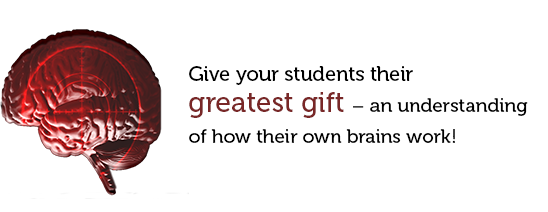
Workshop 8: How to Become a SuperStar Learner
Two-Day Workshop for Students who want to Excel at School!
This highly engaging, hands-on, 2-day workshop explores key findings linked to neuroscience/brain research and challenges students to think about their identity, well-being, concept development, memory and learning, motivation, the importance of sleep and why learning about learning is a key factor in improved engagement. It is a remarkable workshop, typically defined by students as the best 2 days they have ever spent at school!
Students who complete the SuperStar Learner course should be able to:
Section 1: Knowing How Your Brain Learns – neuroscience for beginners
1) name 10 key brain parts and describe their key functions in learning, memory, motivation and sleep
2) determine the role of feedback in how the brain learns
3) create a list of ways to use feedback to improve school performance
Section 2: Information Processing – understanding learning
4) explain how the brain processes information
5) analyse memory techniques and critique a number of learning strategies
6) create an Advantages and Disadvantages matrix to explain the purposes and the benefits of forgetting
7) use research models to determine how top performing students learn
8) summarise what Primacy/Recency means and create a study skills list for effective homework
9) understand and use in context learning, memory and recall terminology
Section 3: Brain Care – the purposes and benefits of sleep
10) clarify the major purposes of sleep; outline cycles of sleep and plan for effective sleep
11) make a list of ‘sleep thieves’ and determine ways to reduce their impact
12) determine best performance times and my down-times and plan for minimal impact
13) create a Personal Sleep Plan, including how to manange devices
Section 4: Developing emotional intelligences
14) define motivation and confidence and create a plan for keeping both elements at their peak
15) explain the concept of Allostasis and describe ways to manage stressors
16) elaborate on what concepts are and how concepts and hope affect study and performance
17) use framed questions and effective self-talk to generate healthy emotions
Section 5: Developing thinking intelligences
18) outline the differences between correct answer, critical and creative thinking
19) undertake a thinking test to determine my levels of critical and creative thinking
20) determine the main types of thinking required and used in a range of jobs
21) intentionally improve critical and creative thinking skills
Section 6: Studying with purpose – assessing talents, strengths and areas for development
22) explain the 4 Worlds Model and use the model to describe individual strengths
23) summarise what personal attributes are and how they relate to learning and job interests
24) undertake ‘My Talents’ Profiling to identify attributes, talents, job interests and areas for development
25) identify factors that are conducive to learning and create a Personal Learning Plan to direct study
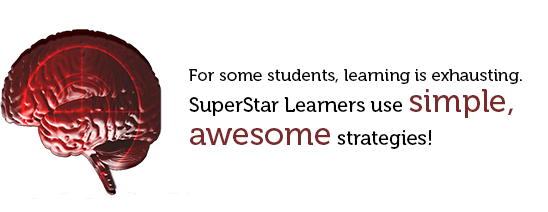
Workshop 9 – Wake Up to the Impact of Sleep (Student Workshop)
Available in 45 minute blocks – also available by Webinar Conference
Using stunning time-lapse photography and clinical evidence, we’ll show students what happens during sleep, including disturbing footage about the effects of consecutive late nights or over-use of screen technologies. We’ll also provide frameworks for students to create their own Sleep Plans, leading them to take control over their sleep habits.
Content:
1. Investigate facts and myths about sleep: becoming sleep savvy!
2. What is sleep: clarify the major purposes of sleep and explain what healthy sleep looks like
3. Sleep Thieves: list factors that prevent sleep (sleep thieves) and create a plan to reduce them
4. Sleep Problems: define and recognise sleep problems and their treatments
5. Understanding how circadian rhythms work: describe the relationships between light and melatonin
6. Managing Stress: explain the relationships between melatonin, cortisol, stress and sleep
7. Mange your devices: learn how to use your willpower to turn off addictive devices!
8. Create a Personal Sleep Plan: work with your family to create healthy sleep patterns
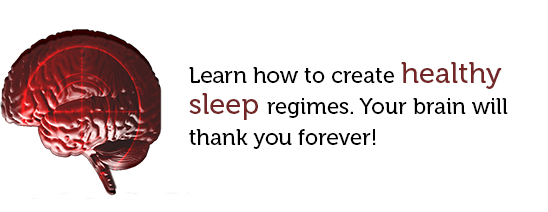
Workshop 10: My Talents: Linking Education with Employment
Schooling with a greater purpose in mind
Available in 2 x 45-minute blocks – also available by Webinar Conference
This course responds to inclusion of Career Planning in national and international curricula.
A practical and innovative course designed to bring your students into the process of identifying their specific talents and interests with regard to further study and employment. Shift more responsibility to students and their families for their future. Build engagement by giving students a language to articulate sought-after components of jobs across growth industries, so they can plan and adjust their learning and obtain online support in documenting their plans.
Content:
1. Investigate the links between employment and education: becoming job savvy!
2. What is work: clarify the major purposes of work and explain the changing nature of employment
3. Characteristics of jobs: list attributes that relate to specific jobs across a number of growth industries
4. My talents: define and recognise personal attributes and how they relate to employment
5. Understanding how jobs work: describe the relationships between talents and career choices
6. Linking thinking processes to the future: explain the why and how of occupational thinking
7. Career Profiling: use our online profiling tools to create a dynamic talents and career profile
8. Mange your learning: learn how to plan your education with employment in mind!
9. Involve family: work with your family to create employment plans that are effective and doable
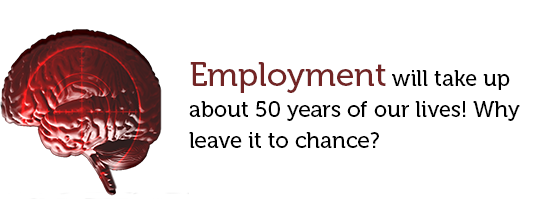
Workshop 11 – Cautionary Tales: The Highs and Lows of Drug Consumption
90 minutes and suitable for students, parents or both!
This powerful presentation explains what drugs are, how drugs work and the big issues surrounding use. The aim is to provide valuable information that opens productive dialogue between parents and their kids. Kids overwhelmingly want their parents to talk with them about drugs. A national survey in Australia found that 76 per cent of 15 to 17 year olds were willing to talk to their parents about drugs and 71 per cent said that parents could influence them not to use drugs’ (1999).
Drugs destroy lives and communities, undermine sustainable human development and generate crime. Drugs affect all sectors of society in all countries; in particular, drug abuse affects the freedom and development of young people, the world’s most valuable asset. United Nations Political Declaration on Global Drug Control (1998)
Content:
1. What are drugs: working definitions using animated graphics that make sense of the complexity of drugs
2. How drugs work: pathways into the brain, the buzz, pathways out of the brain
3. Transportation systems: how drugs are removed from the body –health issues and effects over time
4. When does drug use become drug abuse: knowing limits
5. Addictions: the science and the remedies
6. The BIG Four: alcohol, nicotine, ice, ecstasy, marijuana: how they work, the buzz, the risks, the dangers
7. Tips for remaining safe: supporting family and friends who are using drugs
8. Family discussions about drugs: how to approach it, what matters most
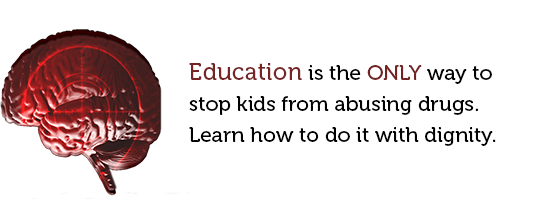
Workshop 12: Parenting with the Brain in Mind
raising great families (a seminar for parents)
120 minutes and suitable for parents (and their kids!). Also available on-line (Webinars)
Parents are crucial partners in the learning process because they are children’s first and most important teachers. ‘Parenting with the Brain in Mind’ is designed to achieve two broad goals:
1) Give practical strategies for supporting academic learning and emotional development at home.
2) Describe the conditions necessary to raise motivated, confident, happy children.
Content:
1. Weighted Elements: why there is an achievement gap and how to support your child at school
2. Motivation and Confidence: developing ‘I can do it’ concepts with your children
3. Allostasis: why parents and their children get stressed! Managing family stress when times are tough
4. The Four World Model: creating an education for the heart, the hands, the intellect and the future
5. Brain Care: the critical role of sleep in learning and behaviour. Developing healthy sleep patterns
6. Conversations with kids: using questions to engage our kids in conversation
7. Emotional Intelligence: exploring the role of emotions in families, learning and relationships
8. Creativity: teaching children to develop thinking skills, creativity, group skills and entrepreneurial skills
9. Learning and Career Profiling: assessing each child’s strengths and employment interests.
10. Understanding excellence: knowing how the smartest kids in the world learn, study and take tests
11. Making homework productive: gain better results and create balanced approaches to study and leisure time
